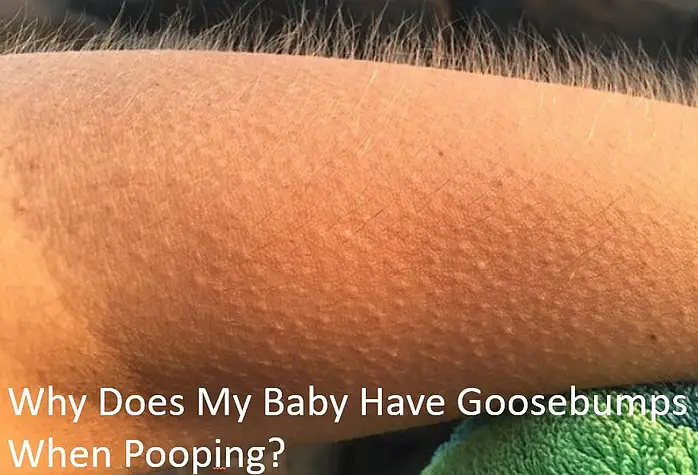Why Does My Baby Have Goosebumps When Pooping? (Explained!)

We’ve all experienced goosebumps on our skin from time to time.
Goosebumps are natural, involuntary body responses to a sudden temperature drop or intense emotional surge.
But hang on.
Why would my baby have goosebumps DURING POOPING? Is that normal too?
Allow me to answer these questions and put your mind at ease.
Why Does My Baby Have Goosebumps When Pooping?
Sweats, chills, and goosebumps on your baby’s body are completely normal reactions experienced during bowel movements. That’s because, during bowel movement, the vagus nerve gets activated and sets off a series of vagus responses involving different organs. The vagus nerve is a fundamental component of the parasympathetic nervous system that connects the brain with all vital organs. And its primary function is to control digestion and bowel movement. So, when your baby strain to poop, the heart rate slows down, and the blood pressure drops. Due to these changes, your little one’s body reacts with sweats, chills and goosebumps.
Why Do Babies Get Goosebumps?
First, you should know that goosebumps don’t serve any particular purpose.
Neither for babies nor for adults.
But this isn’t the case for furry animals. Because goosebumps help them hold on to the body heat during exposure to cold. Or, during threat, the animals stand their hair to appear bigger and scarier.
We humans, however, cannot enjoy these benefits. In fact, goosebumps seem to be just evolutionary leftovers–totally redundant.
Something like a tailbone. It’s useless since we don’t have tails.
What Are Goosebumps??
The most common reason for babies to get goosebumps is because they are cold. Simple as that.
And once they warm up, the goosebumps will typically go away. But we all know that.
However, another less-known reason for goosebumps to appear is due to bowel movements.
It may seem odd, but these phenomena have a good explanation.
So, without further ado, let’s look at this subject in more detail.
Goosebumps While Pooping – Is That Normal?
Rest assured. It is not something abnormal for babies to have goosebumps when pooping. Nevertheless, it doesn’t always occur with every bowel movement.
Perhaps you also experienced chills while having number two? If so, you probably know that it is nothing to fret about.
But the question remains: why is that happening?
Well, it is all related to the vagus nerve.
Basically, the action of pooping stimulates the vagus nerve, which triggers the sensation of goosebumps in your baby. Voila!
I know it is all Greek to most of you, so let me break it into more digestible chunks…
Autonomic nervous system
Let’s begin with a brief explanation of the autonomic nervous system.
As the name suggests, the autonomic nervous system controls and regulates involuntary bodily functions such as heartbeat, breathing, blood pressure, or digestion. (Meaning, we don’t need to think about contracting heart muscles – they will do it by themselves, thanks to the autonomic nervous system).
Now, there are two types of autonomic nervous systems: sympathetic and parasympathetic.
The first kicks in during arousal or threat, the latter during rest and recovery.
Sympathetic Nervous System
The sympathetic nervous system is a “fight or flight” response mechanism. Its primary purpose is to prepare the body and optimize its function during the perceived threat.
So in danger, it slows down non-essential functions such as digestion (so during danger you don’t have the urge to pee). It increases your heart and respiratory rate and expands your lungs. (Because you will probably benefit from extra oxygen in your lungs when you fight for your life).
The sympathetic nervous system will also cause you to sweat, increase pupil size, and give you chills …and goosebumps!
Parasympathetic Nervous System
On the opposite spectrum to the “fight or flight” response is the “rest and digest” response triggered by the parasympathetic nervous system.
It kicks in during rest time and allows the body to repair itself and focus on maintenance and normal bodily functions. So, it regulates digestive and immune systems and relaxes heart rate, breathing, and blood pressure.
Now, the parasympathetic nervous system is mainly composed of the vagus nerve.
Vagus Nerve
The Vagus nerve is the longest nerve in the body, and it runs all the way from the brain to the abdomen and digestive tract.
It constantly sends new sensory information about the state of the vital organs along its path to the brain. Among these organs are the lungs, heart, stomach, liver, pancreas, kidneys, intestines, and colon.
*** As a side note, ever heard the phrase “trust your gut instinct” or have “butterflies in your stomach”? Well, it isn’t just a common colloquialism. In fact, it’s the vagus nerve sending emotional signals from your gut to your brain! Because the vagus nerve literally connects the brain with the gut.
When the vagus nerve gets stimulated, it can trigger a chain of reactions (so-called vasovagal response) to what seems like random events within the body. These are primarily the symptoms of flight or fight response. For example,
- Stress can trigger sweats and nausea.
- Pain can induce blurred vision and fainting.
- Fear can increase the heart and breathing rate of turning pale and dizziness.
- Standing up rapidly can prompt fainting.
Ok, so what? You may ask.
Well, now that we have cleared the basic components and functions of our nervous system, we can focus on the fundamental question: why does your little one experience goosebumps during pooping?
So, when your little one poops (when their body is relaxed or in a “rest and digest” state), it stimulates the vagus nerve. This triggers the sympathetic nervous system and causes a chain reaction in the body.
Now, the physical straining to push the poo out will cause the abdominal blood pressure to drop and slow down the heartbeat.
This, in turn, triggers the skin muscles to contract and causes the bodily hair to stand on. Which results in sweats, chills, or goosebumps (which, as I explained earlier, are symptoms of activation of the sympathetic system).
As a bonus, liquid discharge often accompanies these symptoms, such as salivation and eyes watering.
Well, hope this makes sense to you.
Final Few Lines
There you have it. Hopefully not as complicated as it seemed to be in the beginning, eh?
So, to recap.
During a bowel movement, the vagus nerve (which runs from the brain to the colon and controls the digestive system) gets activated and triggers various sympathetic nervous system responses. As a result of the drop in blood pressure during pooping, these responses often include chills, sweats, and goosebumps.
So, the next time you see your baby with goosebumps, there is likely a surprise hiding in the diaper.
